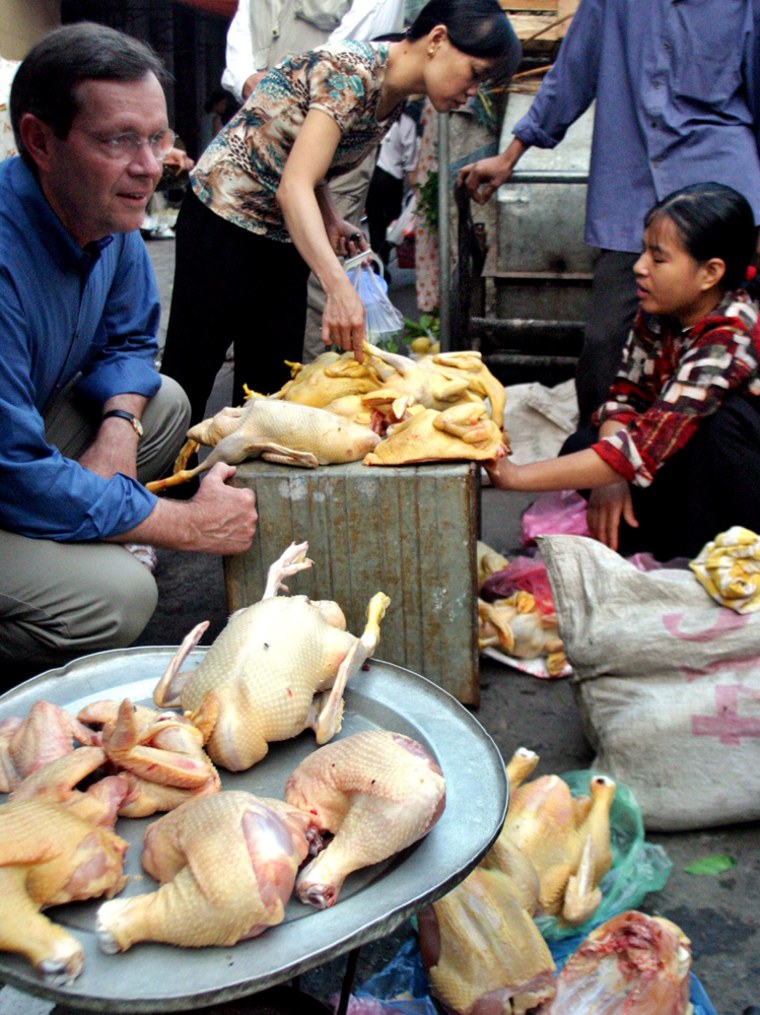After wandering amid cages of birds and rabbits at an open-air market in Hanoi, after watching the gutting of a freshly slaughtered chicken, and after visiting a Haiphong family sickened by bird flu, the United States’ top health official came to a grim conclusion: Preventing the start of a global flu outbreak is just about impossible.
U.S. Health and Human Services Secretary Mike Leavitt was wrapping up a fact-finding mission Saturday in the region hardest-hit by bird flu. He said his tour of Thailand, Cambodia, Laos and Vietnam has painted a clearer picture of just how daunting it would be to identify and contain an outbreak if the virus mutates to a form easily spread among people. It could skip across borders and oceans, killing millions and crippling entire nations.
“Can we create a network of surveillance sufficient enough to find the spark when it happens, to get there fast enough?” he said. “The chances of that happening are not good.”
Leavitt, who is expected in Indonesia on Sunday, told reporters the trip has given him a realistic view of the challenges in Asia where people and animals living closely together is rooted in the culture.
“I was at a market in Cambodia and talked with a pig vendor who traveled 600 kilometers (373 miles) the night before to sell her pigs,” he said. “She had carried them on the top of a bus in a box next to a load of chickens, and I was sitting next to her ... with several other baskets of geese and several baskets of turkeys and ducks and then right next to pigs.”
Economic disincentive
He said the U.S. government was considering ways to help offset the economic loss to Asian farmers forced to slaughter infected flocks, but help would be limited. Without subsidies, poor farmers resist killing their sickened livestock.
Leavitt doesn’t believe the United States — or the rest of the world — is prepared for a flu pandemic. While bird flu has rarely spread person-to-person and has infected just 117 people in two years, most health experts expect it to mutate one day to a more contagious form. The current virus has killed about half of the people it infects, although no one knows how deadly a new form of the bug might be.
The drug that seems most effective against bird flu is Tamiflu, which was created to treat ordinary human flu but is now in short supply and can’t be made fast enough because of pandemic fears.
Leavitt has been talking with drug and vaccine manufacturers to try to increase the stockpile should a catastrophic outbreak reach North America. The government currently has enough Tamiflu to treat about 4.3 million Americans.
Manufacturing of a new vaccine has just started, and Leavitt said the United States may help finance some of the $100 million production burden.
Earlier this month, U.N. Secretary-General Kofi Annan suggested patent rules might be suspended in an outbreak to allow other companies to make generic forms of Tamiflu, produced by Swiss-based Roche Holding AG. In recent days, a company in India announced plans to do that.
However, Leavitt said the United States supports intellectual property laws that bar such action.
The HHS secretary — who was accompanied by the disease chief of the National Institutes of Health and the head of the Centers for Disease Control and Prevention, among others — said he would use information gleaned from his trip to work on U.S. preparedness and to start asking questions of Americans. Health officials have said a quarantine is the best approach if a flu pandemic is unleashed, but Leavitt said Americans are not ready.
“People have not exercised adequate personal preparedness to last more than three or four days in their normal environment without going to the store,” he said. “What’s the responsibility of communities? What’s the responsibility of families? Is it important that the mayor of a small town be thinking about a decision between Tamiflu and a swimming pool?”
